한 줄의 로그로 인해 P1의 온라인 사고가 발생했습니다.
온라인 사고 검토
얼마 전 동료가 밤에 온라인에 접속하기 전에 아주 간단한 기능을 추가했습니다.review코드를 검토하면서 회사의 가치인 노력과 진취성을 생각하고 일시적으로 추가했습니다. 로그 한 줄이 기본이라고 느꼈습니다. 문제는 없었지만, 온라인에 접속하자마자 알람이 많이 떴습니다. 빠르게 코드를 롤백하고, 문제를 발견하고, 추가용 코드를 삭제했습니다. 로그인하고 다시 온라인에 접속했습니다. review代码时想到公司拼搏进取的价值观临时他加一行 log 日志,觉得就一行简单的日志基本上没啥问题,结果刚上完线后一堆报警,赶紧回滚了代码,找到问题删除了添加日志的代码,重新上线完毕。
情景还原
❝
定义了一个
CountryDTO❞
public class CountryDTO {
private String country;
public void setCountry(String country) {
this.country = country;
}
public String getCountry() {
return this.country;
}
public Boolean isChinaName() {
return this.country.equals("中国");
}
}❝
定义测试类
FastJonTest❞
public class FastJonTest {
@Test
public void testSerialize() {
CountryDTO countryDTO = new CountryDTO();
String str = JSON.toJSONString(countryDTO);
System.out.println(str);
}
}运行时报空指针

🎜❝🎜
CountryDTO🎜❞🎜🎜
public static List<FieldInfo> computeGetters(Class<?> clazz, //
JSONType jsonType, //
Map<String,String> aliasMap, //
Map<String,Field> fieldCacheMap, //
boolean sorted, //
PropertyNamingStrategy propertyNamingStrategy //
){
//省略部分代码....
Method[] methods = clazz.getMethods();
for(Method method : methods){
//省略部分代码...
if(method.getReturnType().equals(Void.TYPE)){
continue;
}
if(method.getParameterTypes().length != 0){
continue;
}
//省略部分代码...
JSONField annotation = TypeUtils.getAnnotation(method, JSONField.class);
//省略部分代码...
if(annotation != null){
if(!annotation.serialize()){
continue;
}
if(annotation.name().length() != 0){
//省略部分代码...
}
}
if(methodName.startsWith("get")){
//省略部分代码...
}
if(methodName.startsWith("is")){
//省略部分代码...
}
}
}🎜❝🎜
테스트 클래스 정의
FastJonTest🎜❞🎜🎜
디버그를 통해 호출 링크의 스택 정보를 관찰하세요🎜🎜실행 시간/** * case1: @JSONField(serialize = false) * case2: getXxx()返回值为void * case3: isXxx()返回值不等于布尔类型 * case4: @JSONType(ignores = "xxx") */ @JSONType(ignores = "otherName") public class CountryDTO { private String country; public void setCountry(String country) { this.country = country; } public String getCountry() { return this.country; } public static void queryCountryList() { System.out.println("queryCountryList()执行!!"); } public Boolean isChinaName() { System.out.println("isChinaName()执行!!"); return true; } public String getEnglishName() { System.out.println("getEnglishName()执行!!"); return "lucy"; } public String getOtherName() { System.out.println("getOtherName()执行!!"); return "lucy"; } /** * case1: @JSONField(serialize = false) */ @JSONField(serialize = false) public String getEnglishName2() { System.out.println("getEnglishName2()执行!!"); return "lucy"; } /** * case2: getXxx()返回值为void */ public void getEnglishName3() { System.out.println("getEnglishName3()执行!!"); } /** * case3: isXxx()返回值不等于布尔类型 */ public String isChinaName2() { System.out.println("isChinaName2()执行!!"); return "isChinaName2"; } }로그인 후 복사로그인 후 복사Null 포인터오류: 🎜🎜🎜널 포인터🎜오류 메시지를 보면 직렬화 과정에서
isChinaName()메소드, 현재this.country변수가 비어 있으면 문제가 발생합니다.isChinaName()方法,这时候this.country变量为空,那么问题来了:
序列化为什么会执行 isChinaName()呢?引申一下,序列化过程中会执行那些方法呢? 源码分析
通过 debug 观察调用链路的堆栈信息
图片
图片 调用链中的
ASMSerializer_1_CountryDTO.write是FastJson使用asm技术动态生成了一个类ASMSerializer_1_CountryDTO
직렬화가 수행되는 이유 isChinaName()은 어떻습니까?또한 직렬화 프로세스 중에 어떤 메소드가 실행됩니까? 소스 코드 분석
🎜
사진
🎜<그림 데이터 -tool="mdnice editor" style="max-width:90%">
사진 🎜ASMSerializer_1_CountryDTO.write</ 코드>는 <code style="font-size: 14px;overflow-wrap: break-word;padding: 2px 4px;border-radius: 4px;margin-right: 2px;margin-left: 2px; color: rgb(30)입니다. , 107, 184); 배경색: rgba(27, 31, 35, 0.05); 글꼴 계열: 'Operator Mono', Consolas, Monaco, Menlo, monospace; /code>는 <code style="font-size: 14px;overflow-wrap: break-word;padding: 2px 4px;border-radius: 4px;margin-right: 2px;margin-left: 2px ;color: rgb( 30, 107, 184);배경색: rgba(27, 31, 35, 0.05);글꼴 계열: 'Operator Mono', Consolas, Monaco, Menlo, monospace;단어 나누기: break-all;">asm기술은 클래스ASMSerializer_1_CountryDTO. 🎜❝
asm技术其中一项使用场景就是通过到动态生成类用来代替
java反射,从而避免重复执行时的反射开销❞
JavaBeanSerizlier序列化原理
通过下图看出序列化的过程中,主要是调用
JavaBeanSerializer类的write()方法。
ObjectSerializer实现类JavaBeanSerializer
而
JavaBeanSerializer主要是通过getObjectWriter()方法获取,通过对getObjectWriter()执行过程的调试,找到比较关键的com.alibaba.fastjson.serializer.SerializeConfig#createJavaBeanSerializer方法,进而找到com.alibaba.fastjson.util.TypeUtils#computeGetterspublic static List<FieldInfo> computeGetters(Class<?> clazz, // JSONType jsonType, // Map<String,String> aliasMap, // Map<String,Field> fieldCacheMap, // boolean sorted, // PropertyNamingStrategy propertyNamingStrategy // ){ //省略部分代码.... Method[] methods = clazz.getMethods(); for(Method method : methods){ //省略部分代码... if(method.getReturnType().equals(Void.TYPE)){ continue; } if(method.getParameterTypes().length != 0){ continue; } //省略部分代码... JSONField annotation = TypeUtils.getAnnotation(method, JSONField.class); //省略部分代码... if(annotation != null){ if(!annotation.serialize()){ continue; } if(annotation.name().length() != 0){ //省略部分代码... } } if(methodName.startsWith("get")){ //省略部分代码... } if(methodName.startsWith("is")){ //省略部分代码... } } }로그인 후 복사로그인 후 복사从代码中大致分为三种情况:
@JSONField(.serialize = false, name = "xxx")注解getXxx(): get开头的方法isXxx():is开头的方法序列化流程图
序列化流程图
示例代码
/** * case1: @JSONField(serialize = false) * case2: getXxx()返回值为void * case3: isXxx()返回值不等于布尔类型 * case4: @JSONType(ignores = "xxx") */ @JSONType(ignores = "otherName") public class CountryDTO { private String country; public void setCountry(String country) { this.country = country; } public String getCountry() { return this.country; } public static void queryCountryList() { System.out.println("queryCountryList()执行!!"); } public Boolean isChinaName() { System.out.println("isChinaName()执行!!"); return true; } public String getEnglishName() { System.out.println("getEnglishName()执行!!"); return "lucy"; } public String getOtherName() { System.out.println("getOtherName()执行!!"); return "lucy"; } /** * case1: @JSONField(serialize = false) */ @JSONField(serialize = false) public String getEnglishName2() { System.out.println("getEnglishName2()执行!!"); return "lucy"; } /** * case2: getXxx()返回值为void */ public void getEnglishName3() { System.out.println("getEnglishName3()执行!!"); } /** * case3: isXxx()返回值不等于布尔类型 */ public String isChinaName2() { System.out.println("isChinaName2()执行!!"); return "isChinaName2"; } }로그인 후 복사로그인 후 복사运行结果为:
isChinaName()执行!! getEnglishName()执行!! {"chinaName":true,"englishName":"lucy"}로그인 후 복사代码规范
可以看出来序列化的规则还是很多的,比如有时需要关注返回值,有时需要关注参数个数,有时需要关注
@JSONType注解,有时需要关注@JSONField注解;当一个事物的判别方式有多种的时候,由于团队人员掌握知识点的程度不一样,这个方差很容易导致代码问题,所以尽量有一种推荐方案。这里推荐使用
@JSONField(serialize = false)来显式的标注方法不参与序列化,下面是使用@JSONField注解后的代码,是不是一眼就能看出来哪些方法不需要参与序列化了。public class CountryDTO { private String country; public void setCountry(String country) { this.country = country; } public String getCountry() { return this.country; } @JSONField(serialize = false) public static void queryCountryList() { System.out.println("queryCountryList()执行!!"); } public Boolean isChinaName() { System.out.println("isChinaName()执行!!"); return true; } public String getEnglishName() { System.out.println("getEnglishName()执行!!"); return "lucy"; } @JSONField(serialize = false) public String getOtherName() { System.out.println("getOtherName()执行!!"); return "lucy"; } @JSONField(serialize = false) public String getEnglishName2() { System.out.println("getEnglishName2()执行!!"); return "lucy"; } @JSONField(serialize = false) public void getEnglishName3() { System.out.println("getEnglishName3()执行!!"); } @JSONField(serialize = false) public String isChinaName2() { System.out.println("isChinaName2()执行!!"); return "isChinaName2"; } }로그인 후 복사三个频率高的序列化的情况
三个频率高的序列化的情况
以上流程基本遵循,发现问题 --> 原理分析 --> 解决问题 --> 升华(编程规范)。
围绕业务上:解决问题 -> 如何选择一种好的额解决方案 -> 好的解决方式如何扩展 n 个系统应用; 围绕技术上:解决单个问题,顺着单个问题掌握这条线上的原理。 但其实这段代码我并不满意,原因是和 FastJson 依赖太高了。我想要的效果是,不依赖任何特定的 JSON 序列化框架。当我需要替换掉它的时候,随时可以替换掉。
并且在写代码时,不要过于依赖日志。打日志只需要打紧要且关键的信息即可,不要什么日志都打,我曾见过一个系统,一个小时,把 128G 磁盘跑满的管理系统。几乎没啥并发,但几乎每个请求都输出几 M 的日志,这件事我后面会单独拿出来讲讲。
关于
@JSONField和@JSONType等特性注解,后面我会在团队内规范并给出新的解耦方案,把它们移除掉。위 내용은 한 줄의 로그로 인해 P1의 온라인 사고가 발생했습니다.의 상세 내용입니다. 자세한 내용은 PHP 중국어 웹사이트의 기타 관련 기사를 참조하세요!

핫 AI 도구

Undresser.AI Undress
사실적인 누드 사진을 만들기 위한 AI 기반 앱

AI Clothes Remover
사진에서 옷을 제거하는 온라인 AI 도구입니다.

Undress AI Tool
무료로 이미지를 벗다

Clothoff.io
AI 옷 제거제

AI Hentai Generator
AI Hentai를 무료로 생성하십시오.

인기 기사

뜨거운 도구

메모장++7.3.1
사용하기 쉬운 무료 코드 편집기

SublimeText3 중국어 버전
중국어 버전, 사용하기 매우 쉽습니다.

스튜디오 13.0.1 보내기
강력한 PHP 통합 개발 환경

드림위버 CS6
시각적 웹 개발 도구

SublimeText3 Mac 버전
신 수준의 코드 편집 소프트웨어(SublimeText3)

뜨거운 주제
 7503
7503
 15
15
 1377
1377
 52
52
 78
78
 11
11
 52
52
 19
19
 19
19
 54
54
 Java의 클래스로드 메커니즘은 다른 클래스 로더 및 대표 모델을 포함하여 어떻게 작동합니까?
Mar 17, 2025 pm 05:35 PM
Java의 클래스로드 메커니즘은 다른 클래스 로더 및 대표 모델을 포함하여 어떻게 작동합니까?
Mar 17, 2025 pm 05:35 PM
Java의 클래스 로딩에는 부트 스트랩, 확장 및 응용 프로그램 클래스 로더가있는 계층 적 시스템을 사용하여 클래스로드, 링크 및 초기화 클래스가 포함됩니다. 학부모 위임 모델은 핵심 클래스가 먼저로드되어 사용자 정의 클래스 LOA에 영향을 미치도록합니다.
 카페인 또는 구아바 캐시와 같은 라이브러리를 사용하여 자바 애플리케이션에서 다단계 캐싱을 구현하려면 어떻게해야합니까?
Mar 17, 2025 pm 05:44 PM
카페인 또는 구아바 캐시와 같은 라이브러리를 사용하여 자바 애플리케이션에서 다단계 캐싱을 구현하려면 어떻게해야합니까?
Mar 17, 2025 pm 05:44 PM
이 기사는 카페인 및 구아바 캐시를 사용하여 자바에서 다단계 캐싱을 구현하여 응용 프로그램 성능을 향상시키는 것에 대해 설명합니다. 구성 및 퇴거 정책 관리 Best Pra와 함께 설정, 통합 및 성능 이점을 다룹니다.
 캐싱 및 게으른 하중과 같은 고급 기능을 사용하여 객체 관계 매핑에 JPA (Java Persistence API)를 어떻게 사용하려면 어떻게해야합니까?
Mar 17, 2025 pm 05:43 PM
캐싱 및 게으른 하중과 같은 고급 기능을 사용하여 객체 관계 매핑에 JPA (Java Persistence API)를 어떻게 사용하려면 어떻게해야합니까?
Mar 17, 2025 pm 05:43 PM
이 기사는 캐싱 및 게으른 하중과 같은 고급 기능을 사용하여 객체 관계 매핑에 JPA를 사용하는 것에 대해 설명합니다. 잠재적 인 함정을 강조하면서 성능을 최적화하기위한 설정, 엔티티 매핑 및 모범 사례를 다룹니다. [159 문자]
 고급 Java 프로젝트 관리, 구축 자동화 및 종속성 해상도에 Maven 또는 Gradle을 어떻게 사용합니까?
Mar 17, 2025 pm 05:46 PM
고급 Java 프로젝트 관리, 구축 자동화 및 종속성 해상도에 Maven 또는 Gradle을 어떻게 사용합니까?
Mar 17, 2025 pm 05:46 PM
이 기사에서는 Java 프로젝트 관리, 구축 자동화 및 종속성 해상도에 Maven 및 Gradle을 사용하여 접근 방식과 최적화 전략을 비교합니다.
 적절한 버전 및 종속성 관리로 Custom Java 라이브러리 (JAR Files)를 작성하고 사용하려면 어떻게해야합니까?
Mar 17, 2025 pm 05:45 PM
적절한 버전 및 종속성 관리로 Custom Java 라이브러리 (JAR Files)를 작성하고 사용하려면 어떻게해야합니까?
Mar 17, 2025 pm 05:45 PM
이 기사에서는 Maven 및 Gradle과 같은 도구를 사용하여 적절한 버전 및 종속성 관리로 사용자 정의 Java 라이브러리 (JAR Files)를 작성하고 사용하는 것에 대해 설명합니다.




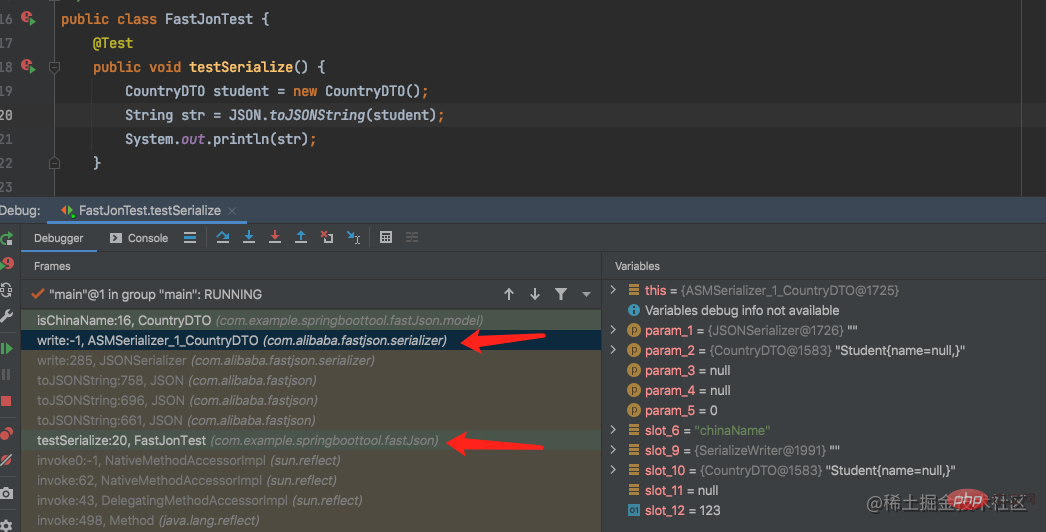
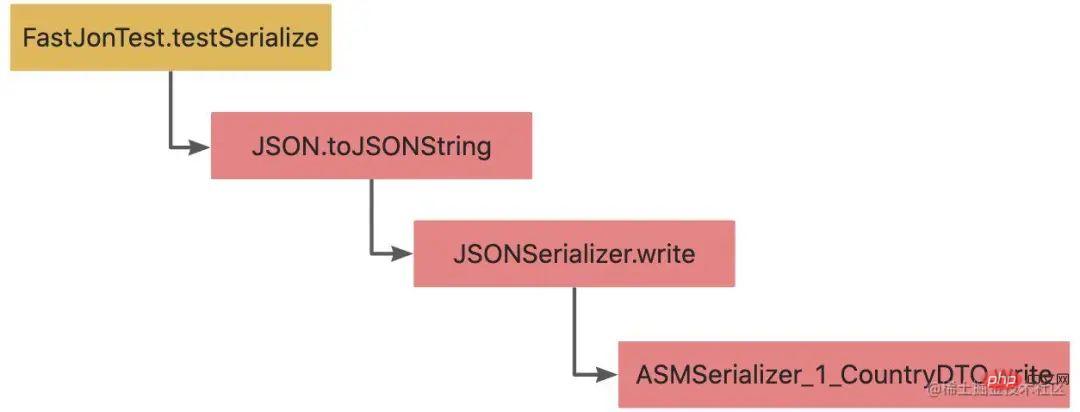
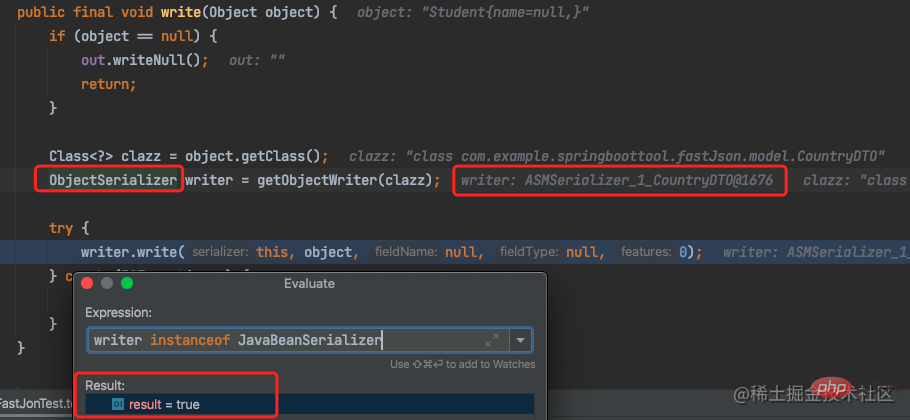 ObjectSerializer实现类JavaBeanSerializer
ObjectSerializer实现类JavaBeanSerializer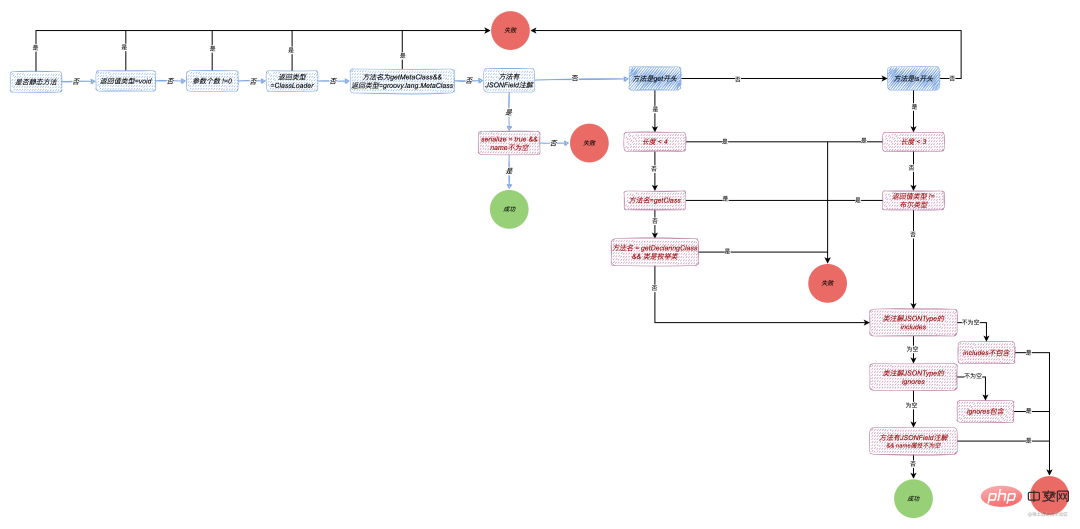 序列化流程图
序列化流程图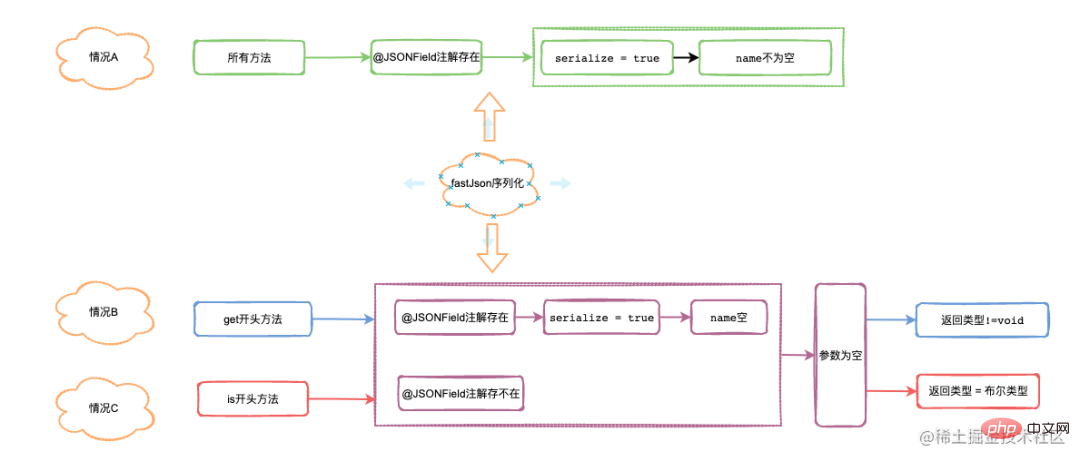 三个频率高的序列化的情况
三个频率高的序列化的情况